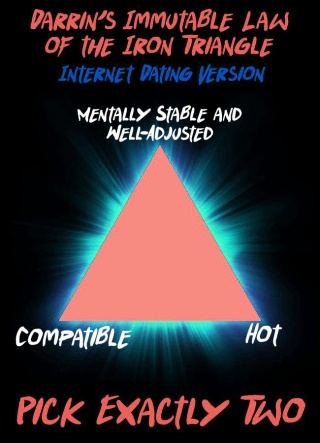Though I’m sure most of you all know me as an ace disc jockey, podcaster, and minor Internet celebrity, I am, truth be told, a business analyst by day. I know, I’m not proud of it, we’re the most expensive line item in your project list, we don’t do anything but point out you’re not following the instructions, and we’re always the first to get laid off in the inevitable corporate resizing exercise for being such know-it-alls and pointing out a corproate resizing exercise seems inevitable. Essentially, I spend most of my time thinking about huge amounts of numbers, data elements, patterns, and scenarios. I then form some useful-yet-easy-to-understand generalization, formula, or simplification about said stuff and sum it up in a one-page document. This document goes on top of another 100 to 150-page document that contains all of my expositions, tables, use cases, examples, proofs, diagrams, and recommendations that nobody cares about. Heck, they don’t even care about the one-pager. Middle management skims through most of it; senior leadership reads the first two paragraphs, tops; boardroom guys usually ask me to summarize it in a sentence or two so they don’t have to read it.
Directly disproportional to the amount of the document you read is the amount Klout you will gain from reposting my document, almost verbatim, on your corporate blog as if it were your own idea. Also, I’ve known people who got to present my ideas as their own in a keynote speech at some conference in Maui or Nassau. I will not, however, dispute that the cool PowerPowerpoint slide deck they made (complete with cool transition effects) was completely their own, however. Plagiarize my words, take credit for my ideas, make me write you a speech on short notice on a Friday afternoon, fine, but I categorically refuse to perpetuate the crime against intelligence that is Microsoft PowerPoint.
But, I digress. The point of this post is to introduce you to my practical application of the Law of the Iron Triangle, first proposed, I believe, by John Storck – who may or may not have been affiliated with either the Illuminati or the Freemasons. Some of you may have heard this in the context of software development, as follows:
This is otherwise known as the illustration of the aphorism “You Can’t Have Everything.” If you want it done correctly and quickly, it will cost you extra. If you want it done quickly and cheaply, quality will suffer. If you want it done correctly and cheaply, then you’re gonna have to wait in line. Now, in twenty years of this, I’ve only had one or two customers who grasped this concept right out of the gate and didn’t come back with one of The Top Five Ineffective Counters to the Iron Triangle:
- Erroneous Assumption to Negate Time Requirement — “Oh, you’ve already written 80% of this, so it should be quick.”
- Unequivalent Value Bargaining to Deflate Cost Needs — “Well, if you do it cheap/free I will bring you all kinds of business from my contacts over the next year.”
- Intelligence-Insulting Trap Baiting to Discount Need for Effective Design — “Well, let’s just do something very basic and simple with the budget I have, do it so that I can change things easily when I come up with new ideas while you’re working on it.”
- Unqualified Assistance that Needlessly Inflates All Three Verticies — “I’ll do all the testing, that way it saves you time and we’re sure everything works right.”
- Insincere Ego Stroking in an Attempt to Debunk the Entire Triangle With One Question — “Yeah, but you’re good enough that you aren’t constrained by a generalization like that, right?”
Trust me, folks, there is no workaround. This is truth. I’ve got 120 pages of analysis to prove it. In fact, I’ve now been able to adapt this to other aspects of existence that were probably not very rigidly defined before.
For example, let’s start with … women! (Update: I have actually been informed that this was covered on the show “How I Met Your Mother” as the “Crazy/Hot Scale.” So, I know I’m not far off on this assertion.)
Moving right along, did you ever seem to notice how the popular music out there is complete crap, the music you love is never popular, and the more you love a certain band, the quicker they seem to break up?
And finally, let’s broaden this to look at live goals in general. Sure, we all probably wish we were doing something other than what we’re currently doing for a living — unless you’re one of those annoying “Type-A” people who actually gets a mad rush selling Agile consulting services to companies with P/L statements the size of third world countries that don’t actually produce a produt — you guys defy any kind of logic.
So, you can spend time and brainpower trying to find a loophole in this fundamental law of the universe … or reading my extensive research and proof that it doesn’t exist … but you will merely be wasting your life and hastening entropy. Not only is it unbreakable, but it’s more ubiquitous than even you suspect. I’ve done the research. It’s game over. We’ll all be a lot happier when you just give in and admit that I know what I’m talking about here.




